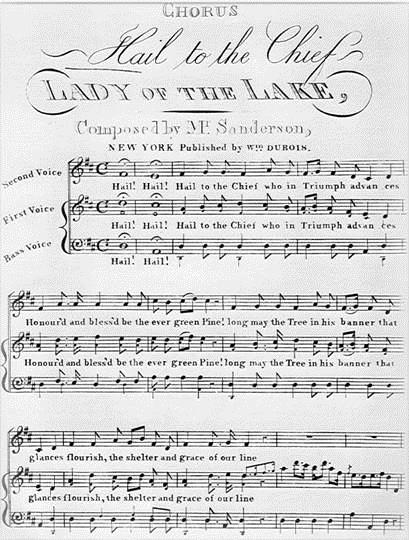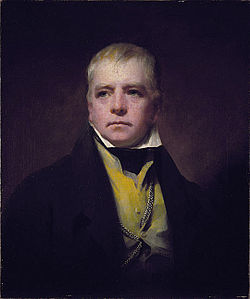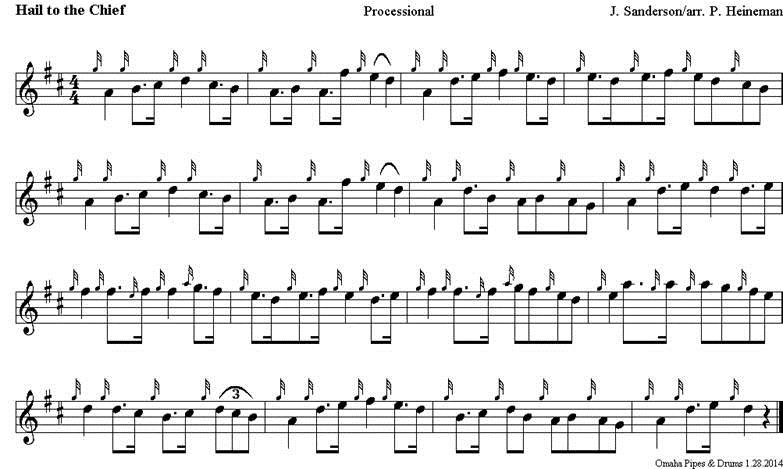"Hail to the Chief" sounds forth as the President of the United States arrives at any formal occasion. Who would guess that its origins lay in Sir Walter Scott's poem, "The Lady of the Lake," which narrates how a Scottish Highlands clan loses its heritage and land to an imperialist invader? Verses from Sir Walter Scott's The Lady of the Lake, including "Hail to the Chief who in triumph advances!" were set to music around 1812 by the songwriter James Sanderson (c. 1769 – c. 1841), a self-taught English violinist and the conductor of the Surrey Theatre, London, who wrote many songs for local theatrical productions during the 1790s and the early years of the 19th century.

Published on May 8, 1810, Scott's work secured the author international fame and broke all records by selling 25,000 copies in eight months. The narrative's adventurous plot and carefully drawn characters were ripe for stage production. In the following year at least three productions were mounted in London theaters and one in Edinburgh, Scotland. The latter, produced by Edmund John Eyre, also opened in Philadelphia's New Theater on January 1, 1812, with music "partly composed, and partly selected, by Mr. J. A. Jones." Among the tunes that Jones selected to include was James Sanderson's "Hail to the Chief," written for one of the London productions.
Sanderson was the conductor of London's Surrey Theater orchestra and wrote many songs for local theatrical productions. He set "Hail to the Chief" to the words of Stanza XIX of the Second Canto of Scott's "Lady of the Lake," a section referred to by the poet as "The Boat Song." The poem's "Chief" was the Scottish folk hero Roderick Dhu, who strove to protect the Douglas clan from their enemy, King James V, but died at the monarch's hand. The story apparently had a particular resonance in America during the War of 1812 because it explored conflicting values while acknowledging both the good and the bad aspects of each contending system. The first U.S. sheet music for "Hail to the Chief" was published in Philadelphia under the title "March and Chorus, 'Hail to the Chief,' in the Dramatic Romance of The Lady of the Lake," at about the same time the play ran.
"Hail to the Chief" was first associated with a Chief Executive on February 22, 1815, when it was played (under the title "Wreaths for the Chieftain") to honor both the belated George Washington and the end of the War of 1812. Andrew Jackson was the first living president to be personally honored by "Hail to the Chief," on January 9, 1829. The tune was among a number of pieces played for Martin Van Buren's inauguration ceremony on March 4, 1837, and for social occasions during his administration. As one party-goer recalled:“The Marine Band...is always ordered from the Navy Yard and stationed in the spacious front hall, from which they swell the rich saloons of the palace with "Hail to the Chief," "Wha'll Be King but Charley," and other humdrum airs, which ravish with delight the ears of warriors, who have never smelt powder.”
It was Julia Tyler, the wife of President John Tyler, who first requested that "Hail to the Chief" be played specifically to announce the President's arrival on official occasions. The tune was included in certain nineteenth century musical instruction books and the future First Lady, Sarah Childress Polk, studied it as a young woman. It was played at her husband James Polk's inauguration but she, perhaps more than others, ritualized its use. As the historian William Seale stated,
“Polk was not an impressive figure, so some announcement was necessary to avoid the embarrassment of his entering a crowded room unnoticed. At large affairs the band...rolled the drums as they played the march...and a way was cleared for the President.”
President Chester Arthur was not fond of the tune and asked John Philip Sousa to compose a new herald. Sousa, then Director of the Marine Band, responded with the "Presidential Polonaise" - nonetheless "Hail to the Chief" endured. President Truman, an amateur musicologist, spent time tracing the origins of the piece and in 1954 the Department of Defense established it as the official musical tribute to the U.S. President.
"Hail to the Chief" is the official Presidential Anthem of the United States. The song's playing accompanies the appearance of the President of the United States at many public appearances. For major official occasions, the United States Marine Band and other military ensembles are generally the performers, so directives of the United States Department of Defense have, since 1954, been the main basis for according its official status. It is preceded by four ruffles and flourishes when played for the President. The song is also played during a former President's state funeral, though it can also be played even if the funeral is not a state funeral such as the funeral of Richard Nixon. The song is in the public domain.



